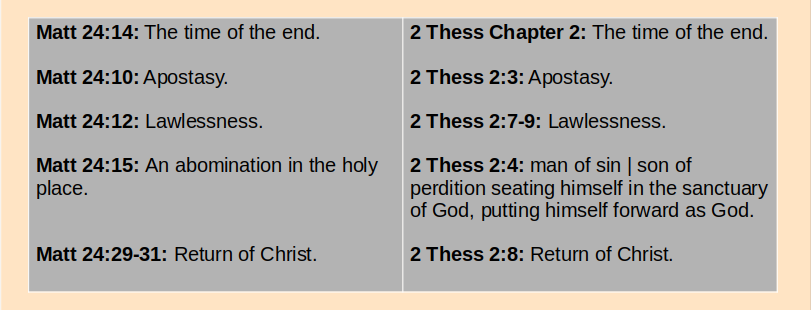In 2 Thessalonians 2, Apostle Paul was warning the brethren against false doctrine some crept in unawares was spreading. So he sent them that 2 Thess.2 Epistle to remind the brethren of what he had taught them at the first.
2 Thess 2:1-5
2 Now we beseech you, brethren, by the coming of our Lord Jesus Christ, and by our gathering together unto him,
2 That ye be not soon shaken in mind, or be troubled, neither by spirit, nor by word, nor by letter as from us, as that the day of Christ is at hand.
3 Let no man deceive you by any means: for that day shall not come, except there come a falling away first, and that man of sin be revealed, the son of perdition;
4 Who opposeth and exalteth himself above all that is called God, or that is worshipped; so that he as God sitteth in the temple of God, shewing himself that he is God.
5 Remember ye not, that, when I was yet with you, I told you these things?
KJV
If you study all... of your Bible, then it becomes easy to understand just who Apostle Paul is talking about as that coming "man of sin" and "son of perdition" that will appear in Jerusalem in a new stone temple for the end, and set himself up over all that is called... God, or that is worshipped.
Apostle Paul then later links the false working by that coming "man of sin" to Jerusalem with the false one Lord Jesus taught about for the end in His Olivet discourse of Matthew 24:23-26. Jesus warned that if someone comes up to you and says something like, "Lo, Christ is here, or there", Jesus said do not believe it. That is within the time of "great tribulation" He showed, which is only at the very end of this present world. And that is the "man of sin" that Paul was reminding the brethren about (including us today).
That future event about that "man of sin" coming to play God in Jerusalem for the end, also involves another standing Jewish stone temple in Jerusalem, what Paul pointed to with "the temple of God".
Jesus showed that too when He quoted from the Book of Daniel about the "abomination of desolation" idol event that will spiritually desolate the future Jew's temple in Jerusalem, per Daniel 11, Daniel 9:27, and Daniel 8:9-14. Now if you have not studied about that prophecy per the Book of Daniel for the end of this world, then you will default to men's stupid theories that leave Bible Scripture, and who are not given to understand this event for the very end of this world.
2 Thess 2:1-5
2 Now we beseech you, brethren, by the coming of our Lord Jesus Christ, and by our gathering together unto him,
2 That ye be not soon shaken in mind, or be troubled, neither by spirit, nor by word, nor by letter as from us, as that the day of Christ is at hand.
3 Let no man deceive you by any means: for that day shall not come, except there come a falling away first, and that man of sin be revealed, the son of perdition;
4 Who opposeth and exalteth himself above all that is called God, or that is worshipped; so that he as God sitteth in the temple of God, shewing himself that he is God.
5 Remember ye not, that, when I was yet with you, I told you these things?
KJV
If you study all... of your Bible, then it becomes easy to understand just who Apostle Paul is talking about as that coming "man of sin" and "son of perdition" that will appear in Jerusalem in a new stone temple for the end, and set himself up over all that is called... God, or that is worshipped.
Apostle Paul then later links the false working by that coming "man of sin" to Jerusalem with the false one Lord Jesus taught about for the end in His Olivet discourse of Matthew 24:23-26. Jesus warned that if someone comes up to you and says something like, "Lo, Christ is here, or there", Jesus said do not believe it. That is within the time of "great tribulation" He showed, which is only at the very end of this present world. And that is the "man of sin" that Paul was reminding the brethren about (including us today).
That future event about that "man of sin" coming to play God in Jerusalem for the end, also involves another standing Jewish stone temple in Jerusalem, what Paul pointed to with "the temple of God".
Jesus showed that too when He quoted from the Book of Daniel about the "abomination of desolation" idol event that will spiritually desolate the future Jew's temple in Jerusalem, per Daniel 11, Daniel 9:27, and Daniel 8:9-14. Now if you have not studied about that prophecy per the Book of Daniel for the end of this world, then you will default to men's stupid theories that leave Bible Scripture, and who are not given to understand this event for the very end of this world.




 That's why I didn't bother to reply. It's just a distraction. Full of things that would take half an hour to correct. I was answering Davy's post anyway, not Tim's.
That's why I didn't bother to reply. It's just a distraction. Full of things that would take half an hour to correct. I was answering Davy's post anyway, not Tim's.